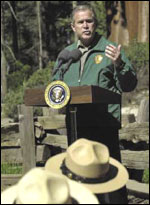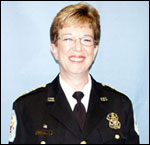
Bush addresses NPS employees in Sequoia National Park.
Photo: NPS.
It’s the reverse of the Midas touch — instead of turning to gold, everything they touch turns to shit.”
That’s how Jeff Ruch, executive director of Public Employees for Environmental Responsibility, explained the recent activities of the Bush administration’s National Park Service to Muckraker. “Parks were supposed to be a feel-good story for the Bush administration,” he said. “It was one of their leading green campaign issues in 2000. He was going to get the parks into tip-top shape. But now it’s all Bad News Bears.”
Yet you aren’t likely to hear park superintendents deliver any bad news about budget crunches or poor air quality or any of the other controversies the NPS has gotten bogged down in over the last three years. The superintendents have gotten orders from Washington to follow a set of sunny, feel-good “talking points” during any interaction with the media, according to internal NPS emails obtained by PEER and made public today.
These memos seem to indicate that superintendents must muzzle any public communication of their concerns. If they feel the need to comment beyond the prescribed talking points, they are required to get approval from their superiors. In an email sent to a high-level NPS employee last month, one regional park service official communicated a mandate from Washington: “Interviews with media regarding budget are to be consistent with [federal-level] talking points … Anything more in depth needs to be ‘blessed’ at the region or [federal] level.”
Talking points have “always been used in politics to help officials stay on message, but never before have they been used as shackles,” said Ruch. “But this is an unusually aggressive effort to avoid further embarrassment on park-related issues during an election year.”
The shackles are particularly constraining on the touchy topic of the NPS budget. While the fiscal year 2004 budget for the park service was bumped up modestly from 2003 levels, much of the funding has been diverted away from standard park operations to security efforts and responses to disasters such as fires, leading to a significant shortage of park funds for the coming summer tourist season.
“Park superintendents have been growing more and more concerned that they have inadequate funds to hire the rangers and naturalists that handle the influx of tourists during the summer season,” said Ruch. “They’re anticipating fewer days of open parks, closed park entrances, and a growing backlog of repair and maintenance problems.”
Superintendents are now required to refer to budget cuts as “service-level adjustments,” and they’re advised to avoid the topic when possible. “[I]f you feel you must inform the public through a press release on this years [sic] hours or days of operation for example … [do not] directly indicate that ‘this is a cut’ in comparison to last year’s operation,” ordered an internal memo [PDF] sent in February to superintendents by a regional park service official, speaking on behalf of NPS Deputy Director Randy Jones.

Orange badge of courage?
Image: NPS.
Here’s one suggested statement from the list of budget talking points: “This administration is very committed to preserving the resources of the National Park System … Despite the challenges, NPS has fared well under President Bush with steady increases to the agency’s budget.”
NPS spokesperson Elaine Sevy acknowledges that money is tight. “Anti-terrorism needs, storm damage for hurricanes, fire emergencies — these are all costs that the Park Service didn’t anticipate but has had to absorb, so when it comes to operating and managing the parks, things are tighter out there,” she told Muckraker.
But Sevy characterizes the talking-point strategy as one that may actually help soften budget woes: “We’re not asking them to follow a script. We’ve never tried to have a unified voice. What we try to do is help our superintendents. The problem is that some of them out there will speak out about a problem before they approach management to help them address it. Before they go and announce, ‘We’re closing a visitor center’ or ‘We’re reducing operating hours,’ we want them to let senior management know because that may not have to happen — we might be able to move funds around and help them come up with a solution.”
Budget issues are not the only area where commentary is being tightly controlled, though. All NPS superintendents received talking points on the subject of air quality in national parks on April 14, one day before eight of the nation’s largest national parks were declared to be in violation of new standards for ozone pollution.
Not only did the air-quality talking points downplay pollution problems, but they played up the purported benefits of Bush’s air policies and proposals: “The air in our most visited park, the Great Smoky Mountain National Park, will be substantially improved by the strong new Bush administration regulations,” read one. “Clear Skies should do for visibility in the Great Smoky Mountain National Park what the Acid Rain Trading Program did for acid rain reductions in the Adirondacks; namely, 100 percent compliance with no lawsuits,” read another.

Teresa Chambers.
Photo: Honestchief.com.
The Bush administration’s punishment for the crime of candor has already been made clear through the fate of Teresa Chambers, chief of the U.S. Park Police. She was put on paid administrative leave last December after she commented to The Washington Post that the diversion of staff to homeland-security duties had led to gaps in other areas of service, creating, by extension, possible public-safety problems in parks and on parkways. Chambers could not grant an interview to Muckraker because she is forbidden from talking to the media without permission, on threat of losing her job. A protest against Chambers’ suspension is gaining momentum through Honestchief.com.
“Everybody knows these talking points are guidelines to avoid what’s known as ‘the Chambers treatment,'” said Bill Wade, director of the Coalition of Concerned National Park Retirees, a group of more than 220 retired park service officials. “If you tell the truth, you’ll be quarantined and lose your job.” This is all part of the Bush administration’s longstanding pattern of controlling information about problems rather than addressing the problems themselves.
“It’s killing employee morale,” said Ruch. “We get regular emails along the lines of, ‘Help, I’m in hell,’ or ‘Thank God I’ve only got a couple more years of this [before I can retire].'” Since superintendents are in senior-level positions, most of them are in the twilight of their careers. And, according to Ruch, many had hoped for a more dignified end to their service: “They’re seeing 25 years of achievements undone in the last 25 months,” he said. “They’ve had to spend [their final years] exclusively doing damage control rather than adding to their lifetime achievements.”


